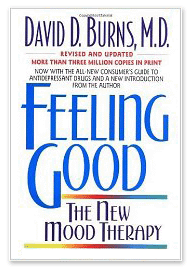 Dr. David Burns suggests that many of our fears are based on self-defeating beliefs (SDBs), false perceptions about ourselves that make us vulnerable to painful mood swings, insecurities, anxiety and depression. Unlike negative thoughts, SDBs are always present, and sabotage our persistent attempts at joy and peace of mind.
Dr. David Burns suggests that many of our fears are based on self-defeating beliefs (SDBs), false perceptions about ourselves that make us vulnerable to painful mood swings, insecurities, anxiety and depression. Unlike negative thoughts, SDBs are always present, and sabotage our persistent attempts at joy and peace of mind.
Burns, adjunct professor emeritus in the Department of Psychiatry and Behavioral Sciences at the Stanford University School of Medicine and the author of the best-selling book Feeling Good: The New Mood Therapy, popularized these ideas as a form of cognitive behavioral therapy (CBT) when his book became a best-seller during the 1980s.
Burns broke down the self-defeating beliefs that stand in the way of full creativity, productivity, joy and intimacy, into two major categories:
INDIVIDUAL SDBs are self-esteem equations that prevent us from feeling we are worthwhile human-beings and have us behaving (ineffectually or inappropriately) in accordance:
Perfectionism: I must never fail or make a mistake.
Emotional Perfectionism: I should always feel happy, confident and in control.
Perceived Perfectionism: People will not love and accept me as a flawed and vulnerable human being.
Achievement Addiction: My worthiness depends on my achievements, intelligence, talent, status, income or looks.
Approval Addiction: I need everyone’s approval in order to be worthy.
Hopelessness: My problems can never be solved. I can never feel truly happy or fulfilled.
INTERPERSONAL SDBs lead to conflicts with other people. Our understanding of how we feel we need to behave in order to be loved or avoid rejection leads us to interact in ways that achieve the exact opposite:
Blame: The problems in my relationships are usually the other person’s fault.
Self-Blame: The problems in my relationships are bound to be my fault.
Entitlement: People should always treat me in the way I expect; if they don’t, I will get angry and frustrated.
Love Addiction: I am doomed to feel empty and unworthy if I am ever rejected or alone.
Submissiveness: I must always try to please others, even if I make myself miserable in the process; I must meet everyone else’s needs and expectations in order to ensure I will be loved.
Perceived Narcissism: The people I care about are demanding, manipulative, and powerful; to avoid rejection and hurt, I must never be spontaneous and open.
Conflict Phobia: Anger, conflict and disagreement are dangerous, and should be avoided at all costs.